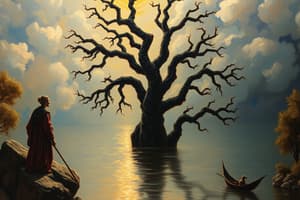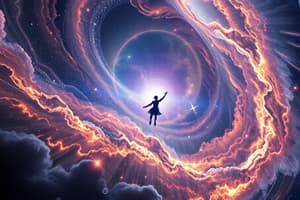Podcast
Questions and Answers
What does cosmogony mean?
What does cosmogony mean?
- The existence of the world
- The study of the universe at large
- The creation of myths in a culture
- The birth of order (correct)
Which cosmogonic myth describes creation as emerging from the lower worlds?
Which cosmogonic myth describes creation as emerging from the lower worlds?
- Mayan
- Navajo (correct)
- Polynesian
- Greek
In an earth-diver creation story, what is typically sent to bring up mud for creation?
In an earth-diver creation story, what is typically sent to bring up mud for creation?
- Coconut shell
- Amphibious creature
- Waterfowl (correct)
- Divinity
Which culture's cosmogony involves Ptah creating through speech?
Which culture's cosmogony involves Ptah creating through speech?
What distinguishes cosmogony from cosmology?
What distinguishes cosmogony from cosmology?
Which type of myth is usually the most important in a culture?
Which type of myth is usually the most important in a culture?
In myths of creation, what is the focus of Division or Consummation Stories?
In myths of creation, what is the focus of Division or Consummation Stories?
What is the main characteristic of Earth-Diver Stories in creation myths?
What is the main characteristic of Earth-Diver Stories in creation myths?
Which type of creation myth involves the first person journeying from a cramped world into this world?
Which type of creation myth involves the first person journeying from a cramped world into this world?
According to Weigle, what do Consummation Stories in creation myths often associate with?
According to Weigle, what do Consummation Stories in creation myths often associate with?
Which type of cosmogony is very common among African and Native American traditions?
Which type of cosmogony is very common among African and Native American traditions?
What is the characteristic shared between cosmogonic egg myths and consummation motif in creation stories?
What is the characteristic shared between cosmogonic egg myths and consummation motif in creation stories?
What is one common aspect of cosmogonic myths from Africa, China, India, South Pacific, Greece, and Japan?
What is one common aspect of cosmogonic myths from Africa, China, India, South Pacific, Greece, and Japan?
Which theme is associated with the Enuma Elish, the creation myth of the Babylonians?
Which theme is associated with the Enuma Elish, the creation myth of the Babylonians?
According to Van Over's six basic themes, what is the role of the primeval abyss in cosmogonic myths?
According to Van Over's six basic themes, what is the role of the primeval abyss in cosmogonic myths?
What is a key theme identified by Maclagan in cosmogonic myths?
What is a key theme identified by Maclagan in cosmogonic myths?
Which culture describes the cosmic egg as the 'placenta of the world'?
Which culture describes the cosmic egg as the 'placenta of the world'?
What distinguishes world-parent myths like Enuma Elish from other cosmogonic myths?
What distinguishes world-parent myths like Enuma Elish from other cosmogonic myths?
What is the main characteristic of creation myths categorized as 'Accretion or Conjunction Stories'?
What is the main characteristic of creation myths categorized as 'Accretion or Conjunction Stories'?
Which process best describes the concept of 'accretion' in creation myths?
Which process best describes the concept of 'accretion' in creation myths?
In 'Secretion Stories' creation myths, what are the typical divine emissions that lead to the formation of the cosmos?
In 'Secretion Stories' creation myths, what are the typical divine emissions that lead to the formation of the cosmos?
Which of the following is NOT an example of non-human formations resulting from divine secretions in creation myths?
Which of the following is NOT an example of non-human formations resulting from divine secretions in creation myths?
In the Chuckchee myth of Ku’urkil, what natural elements are created through Father Raven's secretions?
In the Chuckchee myth of Ku’urkil, what natural elements are created through Father Raven's secretions?
Which type of creation myth involves the emergence of order through divine activities such as defecation and urination?
Which type of creation myth involves the emergence of order through divine activities such as defecation and urination?
What term is used to describe the Maker God, the quintessential architect, artisan, or craftsperson?
What term is used to describe the Maker God, the quintessential architect, artisan, or craftsperson?
What does the term 'Ex Nihilo' mean in Latin?
What does the term 'Ex Nihilo' mean in Latin?
Which of the following is NOT a method used by creators in cosmogonies to bring the world into being?
Which of the following is NOT a method used by creators in cosmogonies to bring the world into being?
Why do mythologists ask probing questions about why certain cultures depict creation through different types?
Why do mythologists ask probing questions about why certain cultures depict creation through different types?
What do some creation myths with multiple characteristics make mythologists question?
What do some creation myths with multiple characteristics make mythologists question?
How do environments influence the moods or tones of creation stories according to the text?
How do environments influence the moods or tones of creation stories according to the text?
Study Notes
Cosmogony and Cosmology
- Cosmogony refers to the birth of order, studying the origin of the universe.
- Cosmology, on the other hand, studies the universe at large and throughout its existence, without inquiring directly into the source of its origins.
Classification of Cosmogonies
- Creation ex nihilo: the creation of the world from nothing, examples include:
- Hebrew: Book of Genesis
- Egyptian: Ptah creates through speech
- Australian: Aboriginal creation myths
- Greek: Hesiod's Theogony begins with a great abyss, void
- Mayan: Popul Vu
- Earth-diver creation story: a divinity sends a waterfowl or amphibious creature to dive to the bottom of the primordial waters and bring up mud to create the world.
- Emergence from lower worlds: examples include:
- Navajo and Hopi myths
- Polynesian myth of various layers within a coconut shell
- Creation from a cosmic egg: examples include:
- Africa, China, India, South Pacific, Greece, and Japan
- Dogon people of West Africa describe the cosmic egg as the "placenta of the world"
- World-parent myth: examples include:
- Enuma Elish: the creation story of the Babylonians
- Egyptian, Zuni, and Polynesian myths
Approaches to Cosmogony
- Van Over's Six Basic Themes:
- Idea of a primeval abyss
- Originator(s) awakened or eternally existing in this abyss
- Originator(s) brood over the water
- Theme of the cosmic egg or embryo
- Creation from sacred sound or spoken word
- Theme of creation from the death of and body parts of the primeval god
- Maclagan's 8 themes:
- Inner and outer
- Something from nothing
- Conjugation of opposites
- World order and the order of the worlds
- Descent and ascent
- Earth body and sacrifice
- Death, time, and the elements
- Weigle's nine-part typology:
- Accretion or conjunction
- Secretion
- Sacrifice
- Division or conjugation
- Earth-diver
- Emergence
- Two creators
- Deus faber
- Ex nihilo
Types of Creation Myth
- Accretion or Conjunction Stories: the birth of order resulting from the mingling or layering of primal elements.
- Secretion Stories: the cosmos resulting from divine emissions, such as vomit, sweat, or urination.
- Sacrifice Stories: the creator god sacrifices him or herself or someone else to complete the work of creation.
- Division or Consummation Stories: the consummation motif shares with cosmogonic egg myths the knowledge that tiny germs contain within them astonishing potential for organized growth.
- Earth-Diver Stories: a god or agent dives to the bottom of the primordial deep and returns with a few grains of sand or a bit of mud from which the earth and the rest of the cosmos eventually arise.
- Emergence Stories: the first people or person journey from an original, cramped world or womb into this world.
- Two Creators: two gods creating the world through cooperation or competition.
- Deus Faber: the Maker God, the quintessential architect, artisan, or craftsperson.
- Ex Nihilo: the creator brings the world into being through speech, breath, dream, thought, or laughter.
Reading Creation Myths
- Keep in mind that the categories through which we discuss creation myths need not be strictly distinct and unrelated.
- Many myths exhibit multiple characteristics.
- Mythologists ask probing questions, such as:
- Why do certain cultures depict the creation through one chosen type rather than another?
- What is the culture ultimately trying to say about itself?
- Do any categories emphasize some values over other values?
- Do their environments influence the moods or tones of their stories?
- What kind of relationship is depicted between creators and humans and does this speak to a culture's contemporary understanding of divine beings?
- What symbols are used and what remains significant about these symbols in more contemporary descendants?
Studying That Suits You
Use AI to generate personalized quizzes and flashcards to suit your learning preferences.
Description
Test your knowledge on classifications of cosmogonies, including Weigle's nine-part typology and types of creation myths such as accretion or conjunction stories. Explore different theories like accretion, secretion, sacrifice, division, earth-diver, emergence, two creators, deus faber, and ex nihilo.




